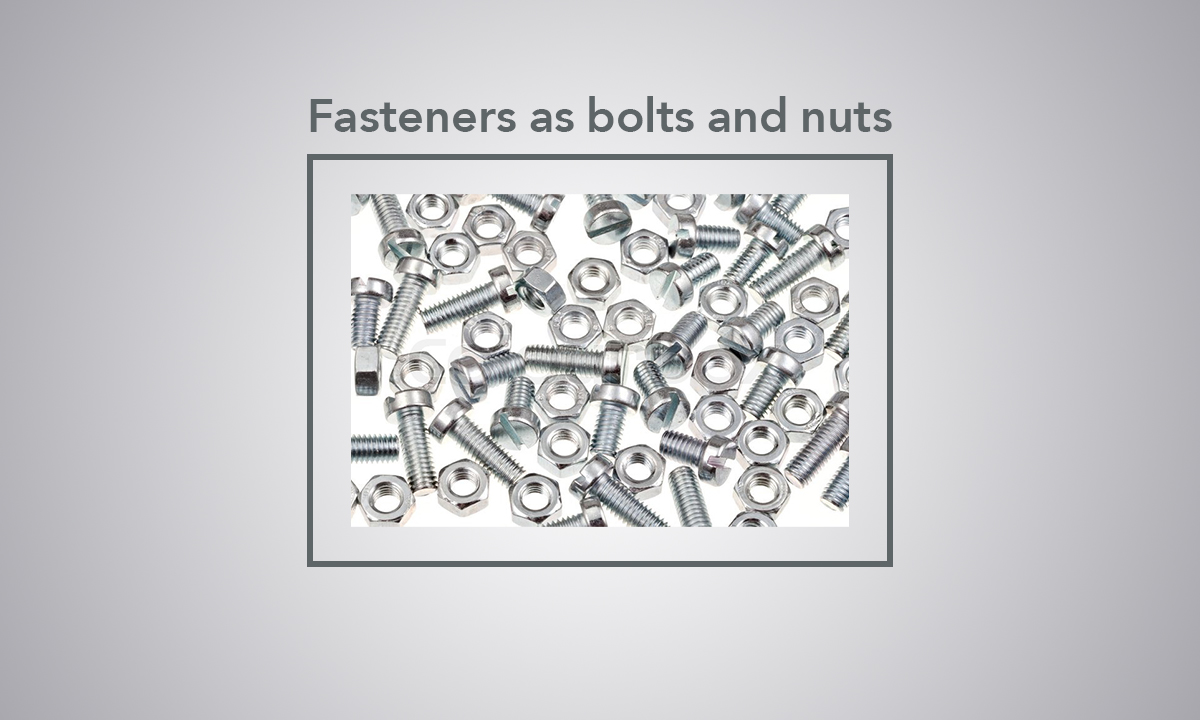Fastener: is a hardware device that mechanically joins or affixes two or more objects together. In general, fasteners are used to create non-permanent joints; that is, joints that can be removed or dismantled without damaging the joining components.
Welding is an example of creating permanent joints.
Other alternative methods of joining materials include crimping, welding, soldering, brazing, taping, gluing, cement, or the use of other adhesives.
Force may also be used, such as with magnets, vacuum (like suction cups), or even friction (like sticky pads). Some types of woodworking joints make use of separate internal reinforcements, such as dowels, which in a sense can be considered fasteners within the scope of the joint system, although on their own they are not general-purpose fasteners.
fasteners are used in:
Ranging from the usual household appliances we have used in our everyday life to some high tech gizmos, we have a common component present in them, that’s a fastener. Even though fasteners are not directly visualized by us, they will play an essential role in our regular life. Whatever it may be, right from holding tables and chairs we sit on to automobiles that we travel as each and every edge of what we have used is held in position through a Fastener. Fasteners can be used in various industries such as Automobile, Petrochemical, Pharmaceutical, Oil and Gas, Rubber, Food processing, heavy machinery, and so on.
Fasteners include:
1.bolts and nuts (threaded)
2.set screws (threaded)
3.washers
4.keys
5.Pins
What should you look for in a fastener? Here are just a few things to consider:
1.Strength.
2.Brittleness.
3.Corrosion Resistance.
4.Galvanic Corrosion Properties.
5.Cost.
Industry: Fasteners in the industry are strongly tied to the production of massive fields such as automobiles, aircraft, appliances, industrial machinery, commercial construction, and infrastructure. More than 200 billion fasteners are used per year in the U.S., and around the world, there is a very wide usage of fasteners like bolts & nuts.
When selecting a fastener for | industrial applications|, it is important to consider a variety of factors:
1.The threading
2. the applied load on the fastener
3.the stiffness of the fastener
4.accessibility
5.Environment, including temperature, water exposure, and potentially corrosive elements.
6.Installation process.
7. Materials to be joined.
8.Reusability.
9.Weight restrictions.
Let’s take a look at some of the key materials used in fasteners:
1.Stainless Steel: An alloy of low carbon steel and chromium, stainless steel offers enhanced corrosion properties, as well as a good price.
2. Steel: The most common fastener material, steel can come plain, or with surface treatments, including chrome or zinc plating, or galvanization.
3.Alloy Steel: alloy steel bolts typically come un-plated.This means that, in terms of appearance, they have a black finish – and while they’re extremely strong, they can be brittle.
4.AluminiumSimilar to stainless steel, aluminum’s corrosion resistance is integral to the material. This means that any nicks or scratches are unlikely to affect its corrosion resistance.
5.Chrome: Polished for appearance, these fasteners are chrome-plated. This allows resistance to corrosion
6.Silicon Bronze: silicon is known simply as bronze. An alloy manufactured mostly from tin and copper with a small addition of silicon, this component can be used to great effect in marine environments, This is due to its excellent corrosion-resistance and high strength.
There are several steps for manufacturing fasteners | bolts | :
1. Wire: Uncoiled, straightened, and cut to length.
2.Cold forging: Molding the steel into the right shape at room temperature.
3.Bolt head: Progressively formed by forcing the steel into various dies at high pressure.
4.Threading: Threads are formed by rolling or cutting.
5.Heat treatment: The bolt is exposed to extreme heat to harden steel.
6.Surface treatment: It depends on the application. Zinc-plating is common to increase corrosion resistance.
7.Inspection: for Form, Fit & Function
8.Packing/stocking: After quality control to ensure uniformity and consistency, the bolts are packaged.




